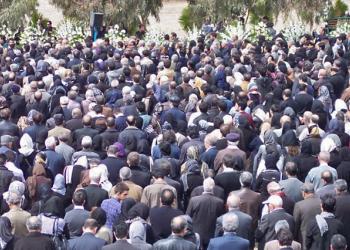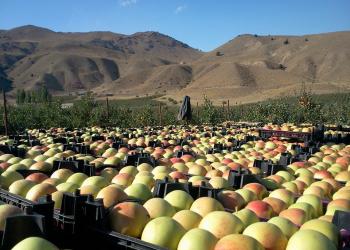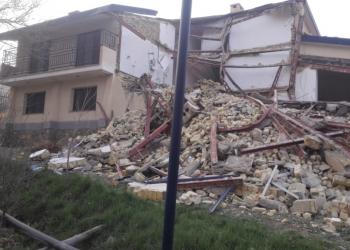 |
| The 2011 funeral of Mr. Khanjani's wife, Ashraf, was attended by thousands. |
The funeral of Ashraf Khanjani, held 10 March 2011, drew more than 8,000 mourners. They came from all walks of life, and most religious backgrounds.
But one very important person was missing: Mrs. Khanjani’s husband, Jamaloddin.
Instead, Mr. Khanjani – one of the seven national Baha’i leaders wrongfully arrested in 2008 for activities wholly related to their religious belief – was in prison.
“They knew each other from childhood,” said Mr. Khanjani’s daughter, Ferida Khanjani, who lives in the USA. “My father loved her for a long time before coming forward to ask for her hand in marriage.”
Mr. Khanjani also missed out on numerous joyous events because of his imprisonment. He missed the wedding of one of his grandchildren, Sharmin, who was married in 2010. And he missed the birth of Sharmin’s child.
 |
| The farmhouse of Mr. Khanjani, which was destroyed by government agents while he was in prison. |
Mr. Khanjani, 83, is a once-successful factory owner who lost his business after the 1979 Islamic Revolution because of his belief in the Baha’i Faith. He spent most of the 1980s on the run under the threat of death from Iranian authorities.
Born 27 July 1933 in the city of Sangsar, Mr. Khanjani grew up on a dairy farm in Semnan province and never obtained more than a high school education. Yet his dynamic personality soon led to a successful career in industrial production – and a summons to leadership in the Baha’i community.
In his professional career, he has worked as an employee of the Pepsi-Cola Company in Iran, where he was a purchasing supervisor. He later left Pepsi-Cola and started a charcoal production business, and he eventually established the first automated brick factory in Iran, ultimately employing several hundred people.
In the early 1980s, he was forced to shut down that factory and abandon it, putting most of his employees out of work, because of the persecution he faced as a Baha’i. The factory was later confiscated by the government.
In his voluntary service to his religious community, Mr. Khanjani was at various points a member of the local Spiritual Assembly of Isfahan and a regional-level Auxiliary Board member, an appointed position which serves principally to inspire, encourage, and promote learning among Baha’is.
 |
| The bountiful harvest of Mr. Khanjani's orchard, which was destroyed by the government while he has been imprisoned. |
In the early 1980s, he was elected to the national governing council of the Baha’is of Iran – a group known as the “National Spiritual Assembly.” In 1980, several years prior to his election, the entire membership of the Assembly had been abducted and was never heard from again. Their successors were arrested and executed in 1981. Mr. Khanjani was thus a member of the so-called “third” National Spiritual Assembly, which later saw four of its nine members executed by the government in 1984.
In the 1990s, Mr. Khanjani was able to establish a mechanized farm on properties owned by his family. Nevertheless, authorities placed many restrictions on him, making it difficult to do business. These restrictions extended to his children and relatives, and included refusing loans, closing their places of business, limiting their business dealings, and banning travel outside the country.
Mr. Khanjani married Ms. Ashraf Sobhani in the mid-1950s. They have four children: Ferida, Maria, Alaeddin, and Emilia. He has seven grandchildren and at least one great-grandchild.
Mr. Khanjani was arrested and imprisoned at least three times before his current incarceration. After years on the run, he was arrested and imprisoned for two months in the late 1980s. During this period of detention, he was intensely questioned. During those interrogations, however, he was able to make considerable headway in convincing authorities of the non-threatening nature of the Baha’i Faith and he, along with many others, was subsequently released.
Like five other members of the Friends (Yaran in Persian), Mr. Khanjani was arrested on 14 May 2008 in an early morning raid. He, with the other six leaders, was subsequently charged with absurd accusations like spying or “propaganda against the regime,” put on trial in 2010, and sentenced to ten years in prison.
As of this writing, nine years have passed – and he has missed much.
As noted, when his wife grew ill in 2011, prison officials refused to give him a temporary furlough so that he could comfort her in her final days.
He was also in prison during the passing and subsequent funeral in 2009 of his older sister, Shams.
And he missed the 2014 passing of his niece, Goalbanoo Khanjani, who was about 55 and had a stroke.
 |
| Mr. Khanjani's farmhouse, after its destruction by government agents. |
Mr. Khanjani was unable to intervene when elements of the Revolutionary Guards systematically attacked and destroyed his family farm and orchard outside Semnan, Iran. Beginning in 2010, agents of the government began to ruin his farm, bulldozing its reservoirs and filling its deep wells. In 2015, the family farmhouse was razed.
“He was not able to go out to stop the demolishing of his land,” said his daughter Ferida. “There are a lot of things that are very heartbreaking.”
During his imprisonment, a number of Mr. Khanjani’s relatives were also arrested and sentenced to prison, serving various sentences related to their religious activities. These relatives has included Mr. Khanjani’s son, Aladdin (Nikki), and his two children, Foad and Leva, and also Mr. Khanjani’s grand-nephew, Navid Khanjani.


